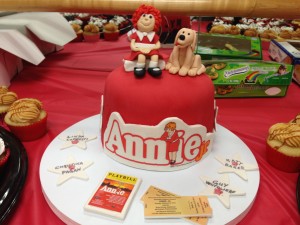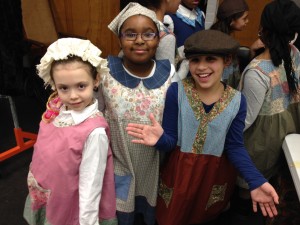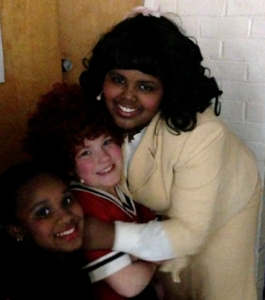I'm an MTI Broadway Junior Star!
I'm an MTI Broadway Junior Star!
By Jason Cocovinis on March 25, 2014
in
Show/Author Spotlight
| Tags:
Annie
 I Think I'm Gonna' Like it Here!
I Think I'm Gonna' Like it Here!I just made my MTI Broadway Junior debut with a cameo appearance as FDR in ANNIE JR. and it was an experience I will remember forever.
The performances were a co-production between Riverdale Children’s Theatre and the Bronx House’s School for Performing Arts, both non-profit organizations from different areas of the borough teaming up to make a difference in the larger community. Through special permission from MTI, these performances featured a few adults as cast members, but their most important roles were as teaching artists who worked tirelessly with the kids during rehearsals and behind the scenes managing costume changes, cues and all of the unexpected tasks that arise during a show.
For some background, I’m the Director of Marketing at MTI so I’m very comfortable espousing “the transformative power of musical theatre” and extolling the benefits of using MTI’s leading educational materials to introduce and deepen young people’s connection to the arts. However, my involvement usually comes at the last stop in a show’s journey. I typically experience the finished product, i.e. seeing the musical performance as an audience member. I’ve seen hundreds of Broadway Junior musicals and have watched thousands of young actors pour their hearts out on stage, but I never get to see the late night rehearsals, the costume fittings, the mic checks or the excitement and energy of getting ready to go on stage for the FIRST time. For many of the 30 kids from this Bronx community, this production of ANNIE JR. was their first “play”, let alone a musical.
Being part of a show is like being part of a family, and when you work with kids, their families become yours as well. In order for a show to be successful, every member of this new family is relied upon to fulfill a role. We received stellar support and encouragement from the parents involved in our production and it made all the difference. One of the moms even spent an entire week making an ANNIE JR. cake for the cast party. Our parents shuttled their kids back and forth between rehearsals, made sure they had enough rest and sleep, helped them learn their lines at home, provided costumes and props and so much more. Without the support of the parents, there would not be a show.
I remember every theatrical experience I had as a kid. They are powerful and lasting memories - from skits in the backyard to the school play based on the history of my small town, I can't forget the thrill of standing in front of an audience and the bonds I made with my cast mates. I took it so seriously...and that was without having the professional materials now available through the MTI Broadway Junior Collection. I see how intently these kids from a new generation approach the show. Broadway Junior makes them feel like professionals - because educators and theatre industry professionals took the time to make the Junior shows right. Each actor feels a sense of ownership and a sense of belonging. They each have their own script and their singing voices are accompanied by full orchestral sounds. They're performing one of the most iconic musicals from the past 40 years. Oh, but absolutely and most importantly...they're having FUN! I know that the memories created by and for these kids will stay with them forever, just like they will stay with me.
So even though I remember in great detail all of my theatrical experiences, I have to admit, it's getting a little harder to do at age 38. I reserve the right to forget things now and again. That's why I wanted to write down and share my experiences.
Here's just a little bit of what I learned from the creative team, the students and more...
FDR's "Catchphrase"

The kids had already been practicing for a couple of months when I arrived at my first rehearsal. They were just beginning to get comfortable with the material and each other. Even so, I was amazed by how immersed they were in the show's dramaturgy. The time period resonated with them - President Roosevelt, the Depression, orphanages, the New Deal all became a rich backdrop of people, places and ideas that provided the perfect introduction to theatre.
Niyyah, a young actor playing an orphan basically summed up all of their knowledge when she came up to me and said without any prompting, "The only thing we have to fear is fear itself" is President Roosevelt's "catchphrase". The best teaching moments are the ones that come naturally and this was one of them. I then had a discussion with a few of the kids about the famous quote and how it applied to their lives. We talked about not letting any obstacles get in the way of pursuing their dreams. They recalled their trepidation the first time they were asked to deliver their lines or dance in front of their peers. They told me how nervous they were about memorizing lines. But they also told me how much they wanted to be a part of this production which meant overcoming their nerves and fears and putting in the hard work.
In Perfect Harmony: Making the Most of the Music

While the Rehearsal CD and Performance Accompaniment tracks are incredibly helpful resources, there's no substitution for a good teacher. Music Director Linda LoPresti gave each cast member a solid foundation in the fundamentals of singing, ensuring they could all hit their notes and blend appropriately without damaging their developing voices. Once Linda knew they could master the basics - she added the harmonies and sections. I was so impressed when we finally put the finale up on stage for the first time. Not because it sounded good...because at that point it didn't. I was impressed because the kids knew it wasn't their best but they were willing to work on it. Linda called on Fiorela who played the role of July to sing the harmony part in front of everyone on stage.
"Elementary and middle school kids may have limited experience with harmony so you’ll have better success if, for example, a group in one particular spot takes the harmony notes. This way, others won’t be thrown off," says LoPresti. "When I audition, I try to find the 'RINGERS.' These are the kids for whom harmony is easy. Have some simple harmonies ready to try and see who has this potential. Keep that in mind when you start assigning parts."
Linda's tactic worked because Fiorela knew every note and she quickly got the rest of the orphans back on track.
Singing is all about confidence and no one demonstrated that more than Naya (our Grace Farrell who was called upon to hit a high note during the show's final number). There was never any doubt that Naya could sing and that she could hit the note. But Naya had never played a lead role before. According to LoPresti, it's critical to, "Make it clear that mistakes are a very important part of the process and acknowledge when you make them too. Make them 'LOUD AND PROUD.' Try to teach that you must not only be kind to others but you must also be kind to yourself." Linda demanded a lot from Naya, but she would not let Naya get down on herself when things got difficult. By demanding her very best while also providing technical and emotional support, Naya rose to the occasion and left the hundreds of audience members captivated by her voice. Linda proved to be a wealth of knowledge. Some of other tips and best practices include:
-Each show begins with a different group of students although the goal of creating an “ensemble” will always be the focus. Learn everyone’s name! Kids can be very sensitive. Play games with that intention. Have a warm-up routine that the kids can learn quickly and even lead.
-As a musical director, I had to learn how to work with a director and understand their responsibilities so that we could be successful together. The director is the “boss” embrace that! Find out how they are organized and build on that. I found it helpful to ask how scenes and songs would be staged so that I could assign harmony parts based on “groups” rather than individuals.
-CHOOSE THE RIGHT SHOW FOR YOUR KIDS! While a challenge is always great, you’ll be frustrated if the music is for more experienced kids.
-Changed and changing voices present another challenge. Think “octaves” and offer the option of singing something down if necessary.
-When you are working with tracks, try to use them as soon as possible since the tempo and familiarity with musical cues are important. While using the piano, slowing down the melody and harmony parts, try to get the music up to tempo as soon as you can.
-Once a song is learned, it’s always amazing to me that when the actors start “moving” and singing, they no longer “sing” with the confidence they had. In rehearsal, I find it helpful to let them walk around the stage in a random fashion while singing to get used to multiple tasks. Movement is KEY!
-Make a big deal about conquering milestones without conveying a feeling of inadequacy to those who are still shy and not quite able to take chances. For them, the ensemble experience should be a celebration. I always give the example that the Yankees don’t all hang out socially nor do they even all like each other, but when working together they want the best for themselves as well as for their colleagues. This eliminates the feeling of “competition.”
-Every show teaches me something new. Every director and each group of performers present new challenges and reveal another way of accomplishing your goals. This organic process can be sometimes hard to trust as it can feel like you are not standing on solid ground. As the teacher, it is up to you to create a safe place for these ever-changing dynamics and reach your intended goal, opening night! There has never been a time when we’ve not gotten there, well, not yet anyway!
I believe Linda, Niyyah and President Roosevelt articulated the bravery and confidence that develops during the theatrical process best, because really, "the only thing we have to fear is fear itself."

























